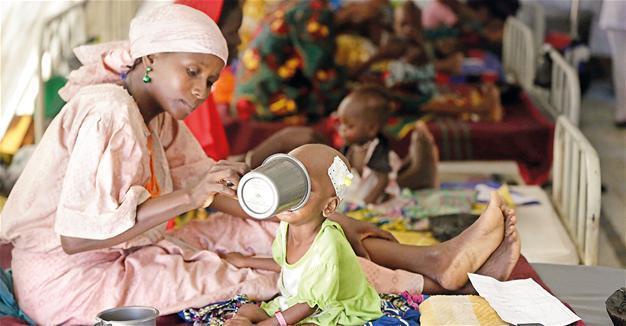UN says 75,000 children in Nigeria risk dying in ‘months’
ABUJA – Agence France-Presse

The United Nations warned Nov. 15 that 75,000 Nigerian children risk dying in “a few months” as hunger grips the country’s ravaged northeast in the wake of the Boko Haram insurgency.
Boko Haram jihadists have laid waste to the impoverished region since taking up arms against the government in 2009, displacing millions and disrupting farming and trade.
Nigerian President Muhammadu Buhari has reclaimed territory from the Islamists but the insurgency has taken a brutal toll, with over 20,000 people dead, 2.6 million displaced from their homes, and famine taking root.
U.N. humanitarian coordinator Peter Lundberg said the crisis was unfolding at “high speed.”
“Currently our assessment is that 14 million people are identified as in need of humanitarian assistance,” by 2017, Lundberg told reporters in the Nigerian capital Abuja.
Out of them, 400,000 children are in critical need of assistance, while 75,000 could die “in [the] few months ahead of us,” Lundberg said.
The U.N. hopes to target half of the 14 million people - a population bigger than Belgium - with the Nigerian government working to reach the rest.
But Lundberg said that the U.N. did not have enough money to avert the crisis and called on international partners, the private sector and Nigerian philanthropists to “join hands” to tackle the problem.
“We need to reach out to the private sector, to the philanthropists in Nigeria,” Lundberg said.
“We will ask international partners to step in because we can only solve this situation if we actually join hands.”
Maiduguri, the capital of northeast Borno state and birthplace of Boko Haram, has doubled in size to two million people as a result of people seeking refuge in camps for internally displaced people.
Meanwhile, Doctors Without Borders (MSF) said Nov. 15 quoting a recent survey that thousands of children have died of starvation and disease in the country.
A survey of two refugee camps in Maiduguri shows a quarter of the expected population of under-5 children is missing, assumed dead, according to the organization. Northeastern Nigeria’s under-5 mortality rates are more than double the threshold for declaring an emergency, Natalie Roberts, emergency program manager for northeast Nigeria, told The Associated Press in a phone interview from Paris.
Despite the World Food Programme warning of “famine-like conditions,” the U.N. has not declared a “level three” emergency, the classification for the most severe crisis that would draw more attention and desperately needed funds to Nigeria.
Speaking on her return from northeastern Borno state, she said the absence of young children was striking.
“We only saw older brothers and sisters. No toddlers are straddling their big sisters’ hips. No babies strapped to their mums’ backs. It’s as if they have just vanished,” Roberts said.
 The United Nations warned Nov. 15 that 75,000 Nigerian children risk dying in “a few months” as hunger grips the country’s ravaged northeast in the wake of the Boko Haram insurgency.
The United Nations warned Nov. 15 that 75,000 Nigerian children risk dying in “a few months” as hunger grips the country’s ravaged northeast in the wake of the Boko Haram insurgency.